Kristin Scott Thomas I've Loved You So Long & Easy Virtue Interview
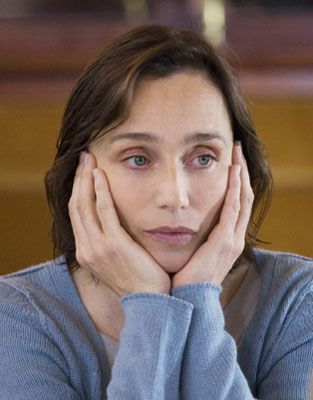
KRISTIN SCOTT THOMAS TAKES ON TWO DISTINCT ROLES.
EXCLUSIVE Kristin Scott Thomas, I've Loved You So Long, Easy Virtue Interview by Paul Fischer in Toronto.Elegant, outspoken and always fascinating, British actress Kristin Scott Thomas has come a long way since audiences fell in love with her in the clasasic Four Weddings and a Funeral. The bilingual actress calls Paris home these days, where she shoots many a French language film including I've Loved You So Long, the powerful story of family struggles and redemption follows a shell-shocked Juliette (Scott-Thomas), who returns to live with her young sister Lea after being banished from the family for 15 years. The French hit finally arrives in the US and later this year the actress will be seen in Australian director Stefan Elliott's farcical 1920s period comedy, Easy Virtue. Both films screened at this year's Toronto Film Festival which is where Paul Fischer spent some time with the actress for this exclusive interview.
QUESTION: Actresses always complain that there's a shortage of decent roles for them. But you seem to be either incredibly lucky, or just incredibly picky about what you take on.
KRISTIN SCOTT THOMAS: Now, which one are we talking about here?
QUESTION: Both. They're so different.
KRISTIN SCOTT THOMAS: They're completely different, aren't they? I think that's where I have been very lucky, is that I've been able to - because the language. I've been able to - well, first of all, alternate. What happens in France is that I have a very - the image that I have in England is that I do the kind of parts that are in Easy Virtue. Now, I've never taken it to that extreme. But that's my kind of genre. And I just get terribly bored of it. And I literally had to be dragged screaming and kicking up to that set. I did not want to do it.
QUESTION: Why?
KRISTIN SCOTT THOMAS: Because I just didn't want to play that part again.
QUESTION: And what changed your mind?
KRISTIN SCOTT THOMAS: I don't know. I just ended up saying, "Oh, all right, then." You know. [LAUGHTER] And I'm friends with Barnaby, and I liked Stephan, and I liked the other cast. I just didn't want to play that part. And then it was just such a laugh, that I really got into it.
QUESTION: It's a classic play - I mean, it's a classic piece of material, I guess. This character is obviously miles apart. Was she more difficult to play?
KRISTIN SCOTT THOMAS: Well, no. Because it's a completely different - it was nice being able to - I think Easy Virtue is an example of building up a character, and creating something. Creating mannerisms, creating - and the other one, I've Loved You So Long, is about acting from the inside out, not from the outside in, being more honest and what I wanted to do playing that part - I wanted to be as raw and naked as possible, as one could be on screen.
QUESTION: And that seems to be a much more European interpretation of a character than a British interpretation of a character. I'm just wondering if you sort of are able to - being bicultural, as it were, to be able to tap into your European sensibilities.
KRISTIN SCOTT THOMAS: Yeah. I think you may be right there. Because I think that very often in - for example, in French cinema, they like to have their leading actors be variations on a theme. They don't like it when they transform. Whereas in Anglo-Saxon world - I guess Anglo-American world. You know - we like our characters to be - we like our actors to be transformative, and to be able to be completely different from one end to the other. You know, we adore people like Streep, or Day-Lewis, or people like that. They really like that. And in France, they're just not very interested and that.
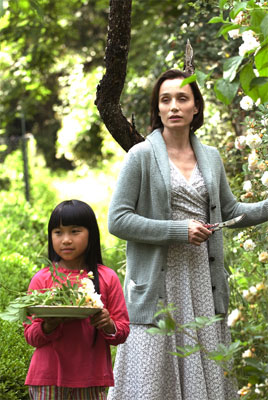 QUESTION: I mean, there's as much bad French cinema as there is bad American cinema. I guess we don't get to see all the bad French films. What are the challenges for you in finding something in Europe that really strikes your fancy?
QUESTION: I mean, there's as much bad French cinema as there is bad American cinema. I guess we don't get to see all the bad French films. What are the challenges for you in finding something in Europe that really strikes your fancy?KRISTIN SCOTT THOMAS: Well, there's always something that's worth doing. Because I'm so lucky to be able to have - I get offered a lot of things in France, I get offered a lot of things from England, and a few things from America. And so I get to pick. So out of those three, you know, I'm very lucky. I will find something that I want to do. It's just, how do I make those choices? Who do you want to work with? Who do you want to give three months of your life to, and which characters are - what do you want to do? Do you want to build up, or whittle down? You know, it's that kind of - you know, I alternate.
QUESTION: Are you even more comfortable now working in French, than you were when you first started doing that? Working in France?
KRISTIN SCOTT THOMAS: Yeah. I like working in French now, yeah. I've just made another French film this summer, which I really enjoyed making. Sometimes I can find it a bit frustrating, if the language is - sometimes the language gets in the way. And on this film, Philippe is very sensitive to that, and really helped me, and allowed me to tweak some of the text so that it wasn't - so that it was something that - in a way that I would say it, rather, because of my accent and the rest of it.
QUESTION: You moved to France because you fell in - you moved there with your husband, right?
KRISTIN SCOTT THOMAS: No, I moved there before I met my husband. And there I met my husband, so I stayed.
QUESTION: Why did you move to France?
KRISTIN SCOTT THOMAS: Because I was a layabout teenager, and didn't know what to do, and thought I might as well not know what to do, and learn a language.
QUESTION: So you stayed.
KRISTIN SCOTT THOMAS: So I stayed, yeah. And I went to drama school there.
QUESTION: Do you feel like a foreigner when you go back to England, then?
KRISTIN SCOTT THOMAS: Yeah. I sort of still do. Except, London is just made up of foreigners now. So it just is - you know, I'm just one of many pinching their jobs. [LAUGHTER]
QUESTION: So as a lay-about teenager, why did you decide acting was the thing for you to do?
KRISTIN SCOTT THOMAS: I just always wanted to do it, you know? And I'd always been embarrassed about it, because I felt slightly - you know, ashamed of the connotations of it, because it implied narcissism and vanity, and this kind of thing. And it was just not on. And so I kept quite quiet about it. And then I just wanted to do it. I wanted to tell stories, and I wanted to be other people. Not be other people. Just - it was through empathy, I think. Yeah, you want to be able to share someone's story, to be able to - and something that has been recurrent, through - you know, and a sort of theme of people I choose to pretend to be. Very often unlikeable people.
QUESTION: Why is that?
KRISTIN SCOTT THOMAS: Well, because I kind of like unlikeable people. Because unlikeable people, they always - they must have a reason. Why are they so horrid?
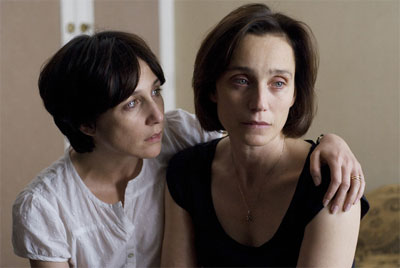 QUESTION: Because - I mean, obviously this woman in Easy Virtue is a pretty bitchy kind of character
QUESTION: Because - I mean, obviously this woman in Easy Virtue is a pretty bitchy kind of characterKRISTIN SCOTT THOMAS: Yeah, but she's so disappointed. It's the disappointment that makes her like that. But she's a caricature, you know? She's a major caricature.
QUESTION: Does that ever translate on set with you?
KRISTIN SCOTT THOMAS: Apparently so. But I'm not the one to ask that.
QUESTION: Well, I did. [LAUGHTER]
KRISTIN SCOTT THOMAS: And - what you get.
QUESTION: I was talking to Jessica [Biel] yesterday. Because, you know, she plays the outsider, and she was obviously the outsider on the set. And she said that it was difficult.
KRISTIN SCOTT THOMAS: Yeah. Yeah. But it wasn't just with me, though. She was difficult, full stop. Or did she blame all on me? [LAUGHTER] I'll have to have words with her. But she's left already.
QUESTION: She has, yes. She was actually very nice.
KRISTIN SCOTT THOMAS: She's a sweet girl, isn't she?
QUESTION: Are you kind of surprised at the fact that your career is what it is?
KRISTIN SCOTT THOMAS: I'm not quite sure how to take that.
QUESTION: Successful.
KRISTIN SCOTT THOMAS: I don't know what - I don't really know what it is. It's just my career. You know, it goes - it has ups and it has downs, and moments I think - will I ever work again? And other times when I think I don't even care if I do. And other times when I'm just so enthusiastic, and I just want more and more and more and more. And this has been one - you're getting me at the end of a period where I was just hungry for work.
QUESTION: Why so hungry?
KRISTIN SCOTT THOMAS: Just, something happened and made me - well, I think what happens is that when I do a play, I get all fired up, and love it so much that - "Yeah, yeah, yeah. I want more, more, more, more, more, more, more." And I was fortunate in that after the play, I went straight in and did I've Loved You So Long. And then I did another French film. And then I did Easy Virtue, and then I did another French film, and Shopaholic. And it just kept coming.
QUESTION: Are you an icy character in Shopaholic?
KRISTIN SCOTT THOMAS: No, not icy.
QUESTION: How would you -describe her?
KRISTIN SCOTT THOMAS: A bit mad.
QUESTION: It's produced by Jerry Bruckheimer. Kristin Scott Thomas and Jerry Bruckheimer. I just can't get that image. [LAUGHTER]
KRISTIN SCOTT THOMAS: Yeah. Well, prepare yourself. [LAUGHTER]
QUESTION: Why that particular film?
KRISTIN SCOTT THOMAS: I just - I really like Isla Fisher. And I just liked the screenplay. It was really funny. It made me laugh. And it was a few days.
QUESTION: Do you play an American?
KRISTIN SCOTT THOMAS: No skin off my nose. I play a French woman.
QUESTION: Oh, do you really?
KRISTIN SCOTT THOMAS: Yes.
QUESTION: Speaking with a French accent?
KRISTIN SCOTT THOMAS: Yes. With a really dreadful French accent.
QUESTION: So, how difficult was that for you to do?
KRISTIN SCOTT THOMAS: Such fun.
QUESTION: How funny. Did you meet Jerry Bruckheimer?
KRISTIN SCOTT THOMAS: Yeah.
QUESTION: Were you kind of surprised by him? I mean, I love him. I've known him for years.
KRISTIN SCOTT THOMAS: I didn't meet him for that long. We didn't ever - we chatted a little bit. I thought he was charming.
QUESTION: Yeah. Interesting. It's, like, your first mainstream Hollywood movie in a while, isn't it?
KRISTIN SCOTT THOMAS: Yeah, yeah, yeah.
QUESTION: I don't think I've seen you in an American film in a while.
KRISTIN SCOTT THOMAS: No, not for a long time.
QUESTION: Why has it been important for you to return to the theatre, and what does that give you?
KRISTIN SCOTT THOMAS: Well, I love it. I discovered the theatre about six years ago. Well, actually, just after making Life is a House. And it actually changed my life, working in theatre. Because I discovered I could do something by myself. I could do - you know, I could be on stage, know my lines, act with other people. I didn't need editing, and I didn't need - you know, it was - it's like an orchestra. You play your bit, and you can join in, and it works. And I really enjoyed that sort of independence in the interpretation, I think. Yeah. The independence, and the interpretation. I enjoyed that. And - and I just loved the texts as well, you know? It's really great speaking words that have been around for 400 years. Or 100 years, or 150 years. And why they've been around that long - because they work. Because, you know - because it's really, really good writing.
QUESTION: It makes you really appreciate, or realize, that there's not a lot of good writing -
KRISTIN SCOTT THOMAS: There really isn't a lot of good writing.
QUESTION: When was the last time you did Broadway?
KRISTIN SCOTT THOMAS: I've never done Broadway. This is my first.
QUESTION: Are you nervous?
KRISTIN SCOTT THOMAS: Yeah.
QUESTION: What's the run?
KRISTIN SCOTT THOMAS: It's until December 21st.
QUESTION: Who else is in it?
KRISTIN SCOTT THOMAS: Peter Sarsgaard has picked up from the other guy. And Zoe Kazan, and - it's all new. We've only met them last week.
QUESTION: So you just basically transplanted your stuff ?
KRISTIN SCOTT THOMAS: Yeah. Yeah.
QUESTION: How interesting.
KRISTIN SCOTT THOMAS: It's most of the original cast, are going over. But then there are four Americans who are joining us.
QUESTION: Is that an Equity thing?
KRISTIN SCOTT THOMAS: Yeah. So it's - no, it's great. We're really, really excited. And it's such a beautiful production.
QUESTION: Is it in the round, or is it proscenium?
KRISTIN SCOTT THOMAS: No, proscenium. But if you've never seen The Seagull, you have to come and seen this.
QUESTION: There's another classic character that you need to play on stage. Have you ever thought of - you'd be a fabulous Lady Macbeth, I would think.
KRISTIN SCOTT THOMAS: Yeah, I think that would be a good one. People keep asking me to do Hedda, but I don't want to do Hedda. I don't like Ibsen.
QUESTION: Why? You're probably very good - are a very bossy person?
KRISTIN SCOTT THOMAS: Probably. Yeah, I'm very bossy. Did Jessica tell you that?
QUESTION: [LAUGHTER] Okay. No, we didn't go - we didn't spend the interview talking about you.
KRISTIN SCOTT THOMAS: You didn't?
QUESTION: No, Kristin. No, no, no.
KRISTIN SCOTT THOMAS: Oh.
QUESTION: [LAUGHTER] It was very brief. Were you bossy on that set, were you?
KRISTIN SCOTT THOMAS: On that set, there wasn't time to be bossy. I have never done a more guerilla-esque film. We had two cameras.
QUESTION: Well, he had no money.
KRISTIN SCOTT THOMAS: No money. We shot the whole thing in seven weeks. And there were two cameras going at the same time. If you said the words right and the camera - it was good for camera, he printed it. That was it. Didn't do another one. It was fantastic. I love working like that. You know, none of this 38-take business. [SNORE] Please, get it together, guys!
QUESTION: I think you should definitely be a director. I would like to be on a set when you're directing.
KRISTIN SCOTT THOMAS: [LAUGHTER] I'll invite you. I don't know. I don't know.
QUESTION: Directing for film, or directing for theatre?
KRISTIN SCOTT THOMAS: No, theatre, I'd like. But I don't know - I don't feel erudite enough. You know, I don't feel like I've done my homework enough, I don't feel. But, you know, maybe one day I could do some little thing discretely in the corner.
QUESTION: What about writing?
KRISTIN SCOTT THOMAS: No.
QUESTION: No writing?
KRISTIN SCOTT THOMAS: No. No.
QUESTION: No writing of memoirs, or anything like that?
KRISTIN SCOTT THOMAS: No. No. No, I'm a lazy cow. [LAUGHTER] I'm - learn somebody else's work, and interpret it. But I do enjoy - I mean, I do enjoy interpretation, I really do. I love - I - one thing I really like doing is radio work, as well. I really like working on the radio. Doing radio plays, and things like that. I love that.
QUESTION: Had Four Weddings not been what it was, do you think your career would have taken longer to get off the ground?
KRISTIN SCOTT THOMAS: That one? No, I don't think so. Because there was - at the same time as Four Weddings, there were all sorts of other ones that were doing stuff, like Mission Impossible, Richard the Third, this Romanian film.
QUESTION: I forgot you were in Mission Impossible.
KRISTIN SCOTT THOMAS: Yeah. So there was a little gang - I made something like six films in one year. And there was a whole gang of ones which - each film had its own particular form of success. I mean, the box office success of Four Weddings was a godsend. But, you know, I think it would have been all right even if that hadn't happened.
QUESTION: Do you still get a great kick out of acting? Or is it - maybe you're at the stage that you realize how lucky you are?
KRISTIN SCOTT THOMAS: No, I really love it. There you go. I mean, the thing - that Easy Virtue is the perfect example of that. I did not want to make that film. And Barnaby had been going on to me about it for two years. And - "Oh, no, I don't want to do it." "Oh, come on. Come on, come on, you can go home every Friday night." "All right then." You know. "I'll do it." And I had such a ball.
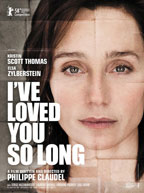
I've Loved You So Long
Starring: Kristin Scott Thomas, Elsa Zylberstein, Serge Hazanavicius, Laurent Grevill, Frederic PierrotDirector: Philippe Claudel
Léa (Elsa Zylberstein) and Juliette (Kristin Scott Thomas) are sisters. The film begins with Léa, the younger sister by fifteen years, picking Juliette up at the airport. We soon realize that the two sisters are almost complete strangers to each other. Juliette has just been released from prison after serving a long sentence. Léa was still a teenager when Juliette, a doctor, was convicted of the murder of her six-year-old son. Léa contacted Juliette when she was released and suggested that Juliette come to live with her. Juliette had no particular desire to see her sister again.
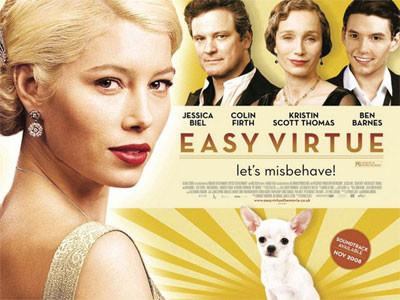
Easy Virtue
Starring: Jessica Biel, Colin Firth, Kristin Scott Thomas, Ben Barnes, Kris Marshall, Katherine Parkinson, Kimberly NixonDirector: Stephan Elliott
Synopsis: Noel Coward's enduring wit translates nicely to the screen with this adaptation of his classic play. Jessica Biel (THE ILLUSIONIST) stars as Larita, an American beauty who weds proper Brit John Whittaker (Ben Barnes, THE CHRONICLES OF... Noel Coward's enduring wit translates nicely to the screen with this adaptation of his classic play. Jessica Biel (THE ILLUSIONIST) stars as Larita, an American beauty who weds proper Brit John Whittaker (Ben Barnes, THE CHRONICLES OF NARNIA: PRINCE CASPIAN). Though the couple is excited about their marriage, John's parents (played by Colin Firth and Kristin Scott Thomas) think that the match leaves much to be desired. An earlier silent version was directed by Alfred Hitchcock.
MORE
- Mission: Impossible Fallout
- Glenn Close The Wife
- Allison Chhorn Stanley's Mouth Interview
- Benicio Del Toro Sicario: Day of the Soldado
- Dame Judi Dench Tea With The Dames
- Sandra Bullock Ocean's 8
- Chris Pratt Jurassic World: Fallen Kingdom
- Claudia Sangiorgi Dalimore and Michelle Grace...
- Rachel McAdams Disobedience Interview
- Sebastián Lelio and Alessandro Nivola...
- Perri Cummings Trench Interview



